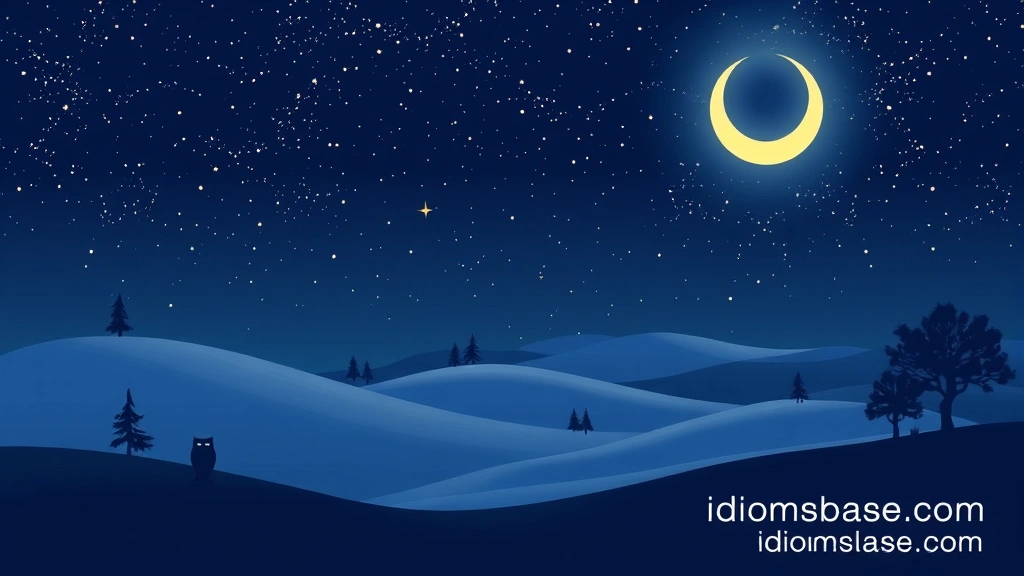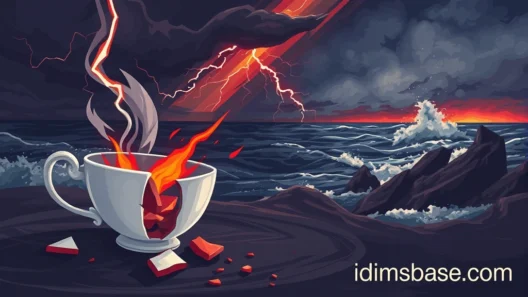Have you ever stopped to truly appreciate the night? It's more than just the absence of light; it's a canvas for our imaginations, a time for introspection, and a source of endless wonder. From the inky blackness that swallows the sun to the twinkling lights of distant stars, the night has inspired poets, artists, and dreamers for centuries. It's a powerful symbol in literature, art, and everyday conversation, often used to represent mystery, peace, or even fear.
But how do we talk about something so vast and multifaceted? That's where metaphors come in! Metaphors are like magic wands for language, allowing us to describe one thing by saying it is another. They help us paint vivid pictures with words, making our descriptions richer and more impactful. Ready to explore some truly enchanting ways to describe the night? Let's dive into 38 amazing metaphors that will transform the way you see the darkness!
Unveiling the Night's Many Faces: 38 Metaphors
Prepare to be amazed by the diverse imagery these metaphors conjure. Each one offers a unique perspective on the night, inviting you to see it in a new light (or darkness!).
Night as a Blanket or Covering
These metaphors emphasize the way night envelops everything.
- Night, a velvet cloak: Imagine a luxurious, soft garment wrapping the world.
- Night, a dark curtain: Picture a heavy drape falling, signaling the end of the day.
- Night, a comforting quilt: Think of it as something warm and cozy, bringing rest.
- Night, a shroud of darkness: This suggests a covering that conceals or perhaps even conceals secrets.
- Night, a silken veil: Delicate and mysterious, hinting at what lies beneath.
Night as a Living Entity or Being
These metaphors give night human-like qualities.
- Night, a silent guardian: It watches over the world as we sleep.
- Night, a gentle whisperer: Bringing quiet thoughts and dreams.
- Night, a weary traveler: Arriving after a long day's journey.
- Night, a watchful eye: Observing everything from above.
- Night, a slumbering giant: Vast and powerful, yet at rest.
Night as a Realm or Place
These metaphors describe night as a distinct environment.
- Night, a kingdom of shadows: Where darkness reigns supreme.
- Night, a vast ocean of black: Endless and deep, full of unknowns.
- Night, a chamber of secrets: A place where hidden things are revealed or kept.
- Night, a stage for dreams: Where our subconscious plays out its stories.
- Night, a canvas of stars: A beautiful backdrop for celestial artistry.
Night as a Symbol of Change or Transition

These metaphors highlight night's role in the cycle of time.
- Night, the turning of the page: Signaling the end of one chapter, the beginning of another.
- Night, the breath between days: A pause, a moment of stillness.
- Night, a gateway to slumber: Ushering in rest and dreams.
- Night, the great equalizer: Making everything uniform in its darkness.
- Night, a reset button: Wiping the slate clean for a new day.
Night as an Object or Substance
These metaphors compare night to tangible things.
- Night, spilled ink across the sky: A vivid image of darkness spreading.
- Night, a pool of black velvet: Deep, rich, and absorbing.
- Night, a sprinkle of diamonds (stars): Focusing on its glittering elements.
- Night, a cup of quiet: Emphasizing its peaceful nature.
- Night, a sculptor of shadows: Shaping the world with its absence of light.
Night as a Force or Power
These metaphors emphasize night's influence and strength.

- Night, a powerful enchantress: Casting spells of dreams and mystery.
- Night, a gentle healer: Bringing solace and restoration.
- Night, a thief of colors: Stealing vibrancy from the world.
- Night, a painter of monochrome: Turning the world into shades of gray and black.
- Night, a silent conductor: Orchestrating the sounds of the nocturnal world.
More Evocative Metaphors for Night
Let's explore a few more unique perspectives!
- Night, a whispered secret: Something intimate and hushed.
- Night, a cosmic lullaby: Singing the world to sleep.
- Night, a cloak of invisibility: Making the familiar disappear.
- Night, a reservoir of peace: A deep well of tranquility.
- Night, the earth's exhale: A long, slow breath out.
- Night, a mirror to the soul: Reflecting inner thoughts and feelings.
- Night, a symphony of silence: Where quiet rules, punctuated by gentle sounds.
- Night, the guardian of dreams: Protecting our subconscious journeys.
Key Takeaways
- Metaphors are powerful tools that enrich our language and understanding.
- Night can be described in countless ways, from a comforting blanket to a mysterious kingdom.
- Using diverse metaphors helps us appreciate the multifaceted nature of night.
- Thinking metaphorically sparks creativity and deeper insights.
Frequently Asked Questions (FAQ)

Q1: What is a metaphor?
A metaphor is a figure of speech where you directly state that one thing is another, even though it's not literally true. It's used to make a comparison and create a more vivid or imaginative description. For example, saying "the night is a velvet cloak" means the night has the qualities of a velvet cloak – it's dark, soft, and covers everything.
Q2: Why are metaphors important in writing?
Metaphors are super important because they add depth, imagery, and emotion to your writing. They help readers visualize concepts, understand complex ideas, and feel a stronger connection to the text. They can make your writing more engaging, memorable, and impactful.
Q3: How do metaphors differ from similes?
That's a great question! The main difference is in the wording. A metaphor directly states that something is something else (e.g., "Night is a dark curtain"). A simile, on the other hand, compares two things using "like" or "as" (e.g., "Night is like a dark curtain" or "Night is as dark as a curtain"). Both are comparison tools, but metaphors are more direct and often more powerful.
Q4: Can I create my own metaphors for night?
Absolutely! That's the beauty of language. Think about what night feels like to you, what it reminds you of, or what it does. Does it feel heavy? Light? Silent? Loud? Does it bring certain feelings or thoughts? Then, try to connect those feelings or actions to something else tangible or abstract. Let your imagination run wild!
Q5: How can using metaphors enhance everyday conversation?
Using metaphors in daily conversation can make your speech more interesting, expressive, and even witty! They help you convey complex ideas quickly and creatively. Instead of just saying "it's dark," you could say "the night has swallowed the light," which paints a much more evocative picture and makes your conversation more memorable.
Conclusion
Isn't it fascinating how many ways we can describe something as common as the night? From a simple "dark" to a "cosmic lullaby," each metaphor offers a fresh lens through which to view the world. We hope this exploration has not only expanded your vocabulary but also ignited your imagination and appreciation for the subtle beauty of language. So next time darkness falls, perhaps you'll see it not just as night, but as a "velvet cloak," a "silent guardian," or even a "stage for dreams." Which metaphor resonates most with you? Feel free to share your favorites, or even invent your own, and let the magic of words continue to illuminate your world!





